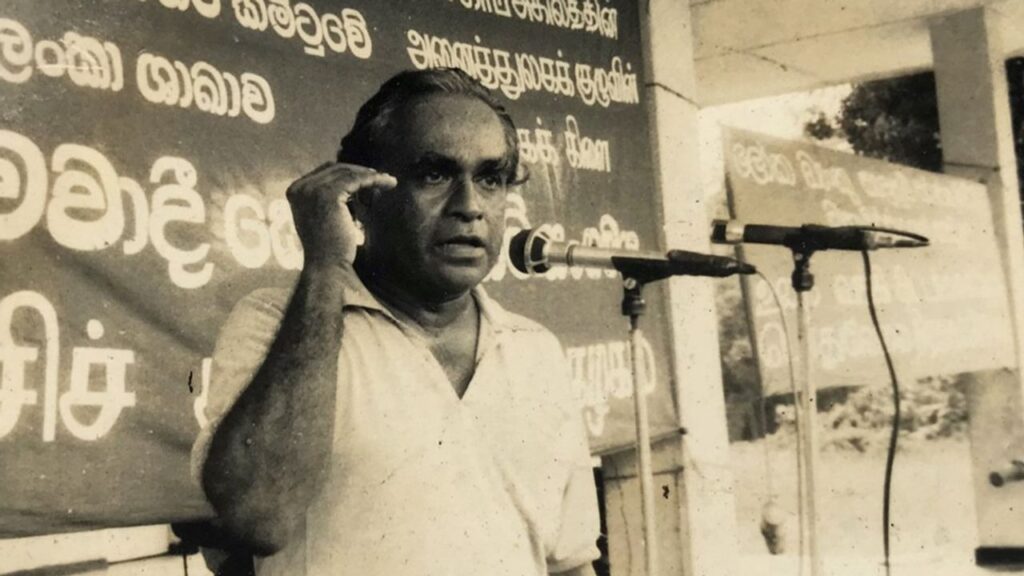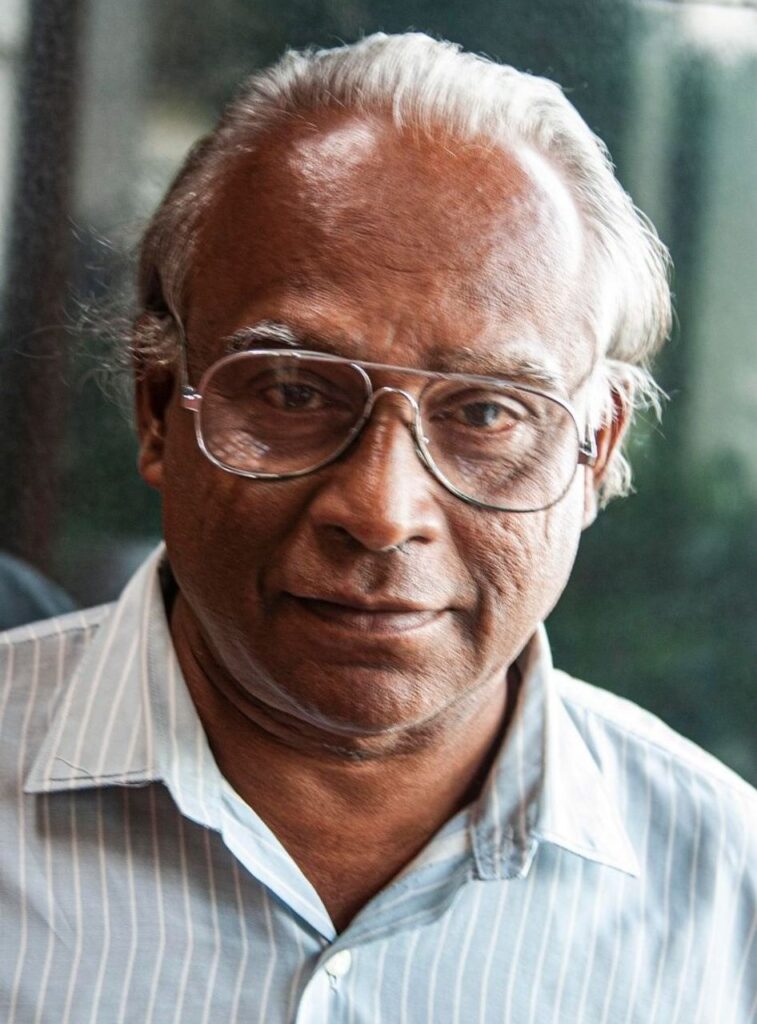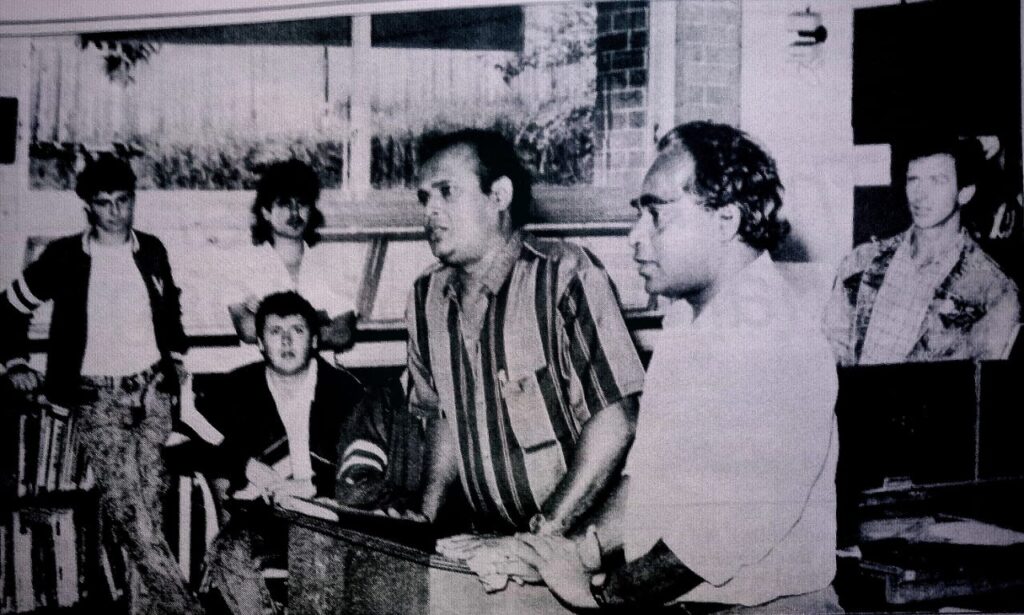Socialist Equality Party (Sri Lanka) (Left)
On April 20, Comrade Nanda Wickramasinghe (Wicks), a leading figure of the Sri Lankan section of the International Committee of the Fourth International (ICFI), departed from his beloved wife, children, grandchildren, and revolutionary comrades across Sri Lanka and the world. Born in 1939 — a year when the flames of the imperialist Second World War were engulfing the globe — Wicks passed away at a time when the world is heated up with intense struggles emerging to defend democratic rights and oppose the looming plans for a Third World War.

The Fourth International, to which Comrade Wiks belonged — the World Party of Socialist Revolution — held its founding congress in September 1938 in France. Born on October 15, 1939, in a remote area of Sri Lanka’s Southern Province, Wiks grew to become a frontline fighter in this international movement. The Fourth International presented its founding perspective through the document: The Death Agony of Capitalism and the Tasks of the Fourth International. A key statement from that program became the enduring foundation of Wiks’ life:
“In the next period a revolutionary party will depend for success primarily on its policy on the question of war. A correct policy is composed of two elements: an uncompromising attitude on imperialism and its wars, and the ability to base one’s program on the experience of the masses themselves.” (p. 22)
The time has arrived to rebuild the international working class based on the lessons of the struggles he led.
Among these lessons, a critical milestone in the class struggle was recorded in the battle against an opportunist tendency that emerged within the Fourth International itself, doubting this perspective and the historical mission of the working class in the face of capitalist pressure. This tendency, later infamously known as Pabloism, suggested that a socialist revolution could not occur for centuries. Instead, Stalinist-led “national socialism” will prevail. And progressive bourgeois leaders would supposedly take the fight against imperialism forward. Consequently, revolutionaries were expected to guide the working class to support such bourgeois forces, systematically subordinating it to capitalist rule in the name of socialism.
In Sri Lanka, it was this reactionary tendency which led the Lanka Sama Samaja Party (LSSP), which identified itself with Trotskyism, to succumb to this reactionary revisionism by entering Sirimavo Bandaranaike’s bourgeois government. In opposition to this ‘great betrayal of 1964’, under the guidance of the ICFI, the Revolutionary Communist League (RCL) was established as its Sri Lankan section. Wicks was at the forefront of the struggle to build the RCL, together with its founding Secretary, late Keerthi Balasuriya, his successor late Wije Dias, Ananda Wakkumbura, K. Ratnayake — presently the Sri Lankan editor of the World Socialist Web Site — along with a progressive group of youth. The RCL was founded based on the theory of Permanent Revolution, advanced during the Russian Revolution. Today, when opportunism has been completely absorbed into capitalism, the truth of that struggle shines even brighter.

“With regard to countries with a belated bourgeois development, especially the colonial and semi-colonial countries, the theory of the permanent revolution signifies that the complete and genuine solution of their tasks of achieving democracy and national emancipation is conceivable only through the dictatorship of the proletariat as the leader of the subjugated nation, above all of its peasant masses.
“… But the alliance of these two classes can be realized in no other way than through an irreconcilable struggle against the influence of the national-liberal bourgeoisie.
“The dictatorship of the proletariat which has risen to power as the leader of the democratic revolution is inevitably and very quickly confronted with tasks, the fulfillment of which is bound up with deep inroads into the rights of bourgeois property. The democratic revolution grows over directly into the socialist revolution and thereby becomes a permanent revolution.
“Socialist construction is conceivable only on the foundation of the class struggle, on a national and international scale. …” (The Permanent Revolution – Leon Trotsky) Establishing of Revolutionary Communist League (RCL) in 1968 was the culmination of this relentless and courageous struggle.
Today, no alternative path remains even to fulfill the most basic needs of workers, youth, and other oppressed people. Since the late 1980s, the globalization of production has grown beyond national boundaries, shattering all nationalist strategies and programs, economically and politically. All political organizations tied to nationalism — national liberation movements, reformist parties, and trade unions — have been forced to abandon their old programs and openly transformed into imperialist agencies against the working class.
Founded in 1968, the Revolutionary Communist League transitioned into the Socialist Equality Party in 1995, aligning with the historical decision of the ICFI to transform all its sections under the name Socialist Equality Party. This step was based on two fundamental reasons:
- To defend and elevate the proletarian internationalist perspective against an anti-Trotskyist tendency, which viewed the ICFI as a coalition of national parties rather than the world party of socialist revolution.
- The results of globalization had already objectively established the fact that ICFI has become the world party of the working class – regardless of who accepted it or not. Any other organization had no objective basis to contest it or substitute for it.
What we outlined above relates to the historic victory secured by Wicks and his comrades in the struggle for internationalism, under very oppressive circumstances. This needs further elaboration.
At the time, the ICFI leadership (then led by the British Workers Revolutionary Party) failed to carry through the struggle against Pabloite opportunism to a final victory. As a result, under the pressure of the deepening crisis of world capitalism, the leadership bowed down to the pressure. This bowing down, manifested as the step-by-step submission of ICFI to nationalist adaptation, emerged within the Healy, Banda, Slaughter leadership of the British section. One form this took was the abandonment of the Bolshevik Party concept. They ignored the democratic rights of sections to question ICFI matters and tried to impose their authority arbitrarily over the entire movement.
Describing his experience, David North — then leader of the Workers League, and now the chairperson of the Socialist Equality Party (US) and of the WSWS Editorial Board — wrote:
“As for Healy, he was clearly stunned by my presentation of differences and made no attempt whatsoever to debate the issues I had raised. But he was, in fact, less troubled by my criticisms than by the fact that they had suddenly shattered the unity of the WRP leadership. In private discussions, Healy furiously accused me of “interfering” in the affairs of the WRP and “disrupting” his cadre—as if it was somehow unprincipled and illegitimate for a representative of the Trotskyist movement in the United States to give his views on the work of the Trotskyist movement in Britain! …” — David North, Gerry Healy and His Place in the History of the Fourth International, Chapter 9: The “Dialectics” of Opportunism
Healy needed this status to suppress and cover up the political crisis that emerged within the party. Healy pushed through a motion at the Seventh Congress of the WRP giving himself the power to suspend and expel not just individuals but entire sections without any debate. Without internal democracy and democratic discussion, a revolutionary party cannot survive. However, Healy — now bowed to capitalist pressure — assumed the role of an agent to subordinate the whole party to imperialist interests. Therefore, his actions were inevitable.
Against this backdrop, the RCL could line itself up without wasting time, with the initiative taken by the Workers League to save the organization. 1985-86 struggle delivered the final assault to Pabloist opportunism. The RCL, fighting shoulder-to-shoulder with the Workers’ League against the WRP deserters, could play a fundamental role, both theoretically and politically. Wicks was one of the leaders who physically participated in this struggle. Later, the insights gained into the objective conditions that led to the degeneration of opportunistic leadership were articulated in the 1988 perspective: The World Capitalist Crisis and the Tasks of the Fourth International. Wicks served as a member of the drafting committee for that document.
A great effort is required to absorb and assimilate the lessons of this struggle. During the time, a few members were capable of handling English and, the initiative Wicks has taken and his tireless efforts to translate the relevant documentation to Sinhala for the education of party Cadre is commendable and will be ever commemorated. From the outset, he was instrumental in translating a heavy load of documentation containing internal documents of the International Committee and other documentation to Sinhala. That was one of the major works shouldered by Comrade Wicks for the task of developing an internationalist cadre in Sri Lanka. Comrade Wicks was the prominent translator during the meetings International Committee participated. He handled both Sinhala and English fluently.
The work carried out by the ICFI, during and after the 1985 split, through an analysis of its lessons, holds significant historical importance. That report has since been incorporated into a collection of documents that encapsulates the rich experiences of the entire Marxist movement. Today, the struggle of the international working class must be firmly grounded in the lessons drawn from this decisive split.

However, if we fail to point out that Wicks and the leadership, despite their break with the Healy leadership, were not entirely able to free themselves from certain ingrained habits inherited from the previous period, we risk suppressing vital lessons. Earlier, we explained how Healy’s leadership, acting against the Bolshevik concept of democratic centralism, stifled political development by promoting bureaucratic practices. In Healy’s hands, this degenerated into a form of centrist democratism — the complete opposite of the Bolshevik method, which required the fullest democracy during discussions and decisive, united action afterward. This perversion of democratic centralism mirrored the opportunistic bureaucratism of Stalinism. For the Bolsheviks, the concept of centrist democratism held no meaning beyond certain exceptional circumstances, such as times of war or revolution when special necessities arose.
Wicks did not abandon the formula of centrist democratism. He continued to adhere to the approach previously followed, which held that without it, the party could not be built. As an example, throughout the period following the split, not only Wicks, but also others, translated ‘Democratic Centralism’ as ‘මධ්යගත ප්රජාතන්ත්රවාදය’, (which means centrist democratism) in their writings. This mistranslation has already caused significant damage to the theoretical and political development of the party.”
To state without exceeding the limits of this article, after the split, we faced external conditions that restricted the full assimilation of its lessons. Among these were the sudden death of Keerthi Balasuriya, the leading Marxist theoretician in South Asia and one of the principal architects of the Healy split, the blood-soaked repression against workers and youth that erupted with the signing of the 1987 Indo-Lanka Accord and continued well into the early 1990s. During this period, opportunist organizations aligned themselves with these repressive conditions, while the party, exposing them, focused more on agitation for building an independent workers’ movement. It took the party a considerable amount of time to break from this pattern, and it was not able to carry out the necessary transformation successfully. Instead of developing a unified effort to formulate a perspective and program, the SEP leadership relied merely on their personal knowledge and experience, which in turn hampered the development of the cadre. Overcoming this requires a more determined struggle, and such a struggle will elevate the party to a higher level
Nevertheless, Comrade Wicks did not waver from the decision he had taken to contribute to the mobilization of the international working class against world imperialism and to the building of the World Party. Instead, he consciously established himself as a committed participant in that historic struggle. Although Wicks, due to his deteriorating health, was not officially reappointed to the SEP Central Committee and Political Committee after the 2018 party congress, he was always welcome to participate in these committees whenever he was able. He continued to contribute to the discussions of these committees until his worsened physical condition prevented him from doing so.
In Chapter 9 of The Struggle for a Proletarian Party, James P. Cannon, one of the founding leaders of the Fourth International, wrote: “Bureaucratic conception of leadership as a function that belongs exclusively to the people in the office at the centre, is abominable and intolerable. … Down with office leadership! To hell with office leadership! You can never build a proletarian movement from an office!” Comrade Wicks’ engagement with party work was molded by this perspective. He placed particular importance on political agitation among the masses and made a conscious effort to dedicate significant time and attention to it.
Likewise, Wicks was patient when communicating what he understood to others and expressed himself with clarity. He was an able speaker who knew the art of structuring and delivering his points effectively. In this regard, he was second only to Keerthi Balasuriya and Wije Dias. A revolutionary movement cannot be sustained without skilled revolutionary writers, organizers, and speakers.
Although personal circumstances existed that could have allowed him to lead a more comfortable life, Wicks never believed there was any greater fulfillment than dedicating himself as a full-timer at the party’s call. He held that the most important task in a person’s life is to dedicate oneself to the path of progress — the cause of social revolution. As James P. Cannon, the Trotskyist leader in the United States, once stated: “The party honours and respects its professional staff. It considers the occupation of a professional revolutionist to be the most honourable of all occupations. The highest aspiration and ambition of every young party member should be to qualify himself for such a profession in life.”
